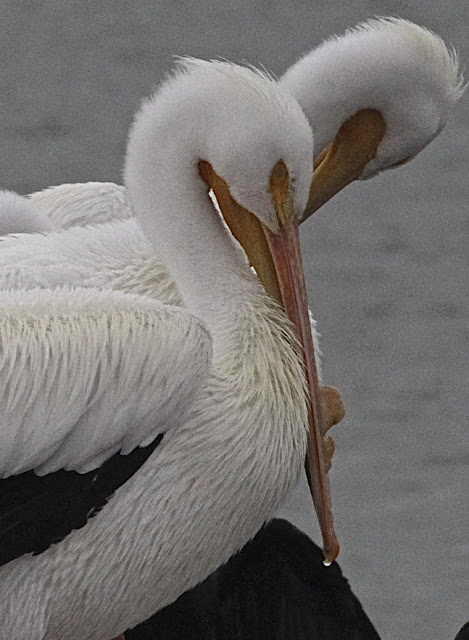A roundup of the week's news of birds and the environment:
White Pelicans preen next to Galveston Bay.
*~*~*~*
The fact that the Climate Bill actually managed to pass in both houses of Congress is little short of a miracle. It's less than what environmentalists were hoping for, of course, and, in fact, some groups believe it will do more harm than good. I guess they would have preferred nothing.
*~*~*~*
It's not exactly concerning our earthly environment but the pictures of our larger galactic environment from the Webb telescope are nothing short of spectacular.
*~*~*~*
Even as the climate bill was being debated, word came that our planet's Arctic region is heating up much faster than had been predicted.
*~*~*~*
This is the
American Bird Conservancy's Bird of the Week. It is the
Newell's Shearwater ('A'o), a Hawaiian specialty. The species is listed as critically endangered, with less than 10,000 remaining in the wild.
*~*~*~*
Some scientists are saying that the billions that the U.S. is spending on saving communities from Western megafires
are being misdirected.
*~*~*~*
New research provides evidence that we should
designate more land and water for protection to save biodiversity and fight climate change but we should also do a better job of actually protecting those designated sites.
*~*~*~*
When one pod of Atlantic spotted dolphins invaded the territory of another pod off the Bahamas, conflict might have been expected. However, proving the superiority of their intelligence, the
two pods intermingled peacefully.
*~*~*~*
We know that humans impact Nature but we may not recognize that Nature
impacts humans in a host of ways that may be intangible and yet contribute to our overall well-being.
*~*~*~*
*~*~*~*
Who knew that sponges sneezed? Well, it seems that they do and that the product of those sneezes
actually helps to feed other marine organisms.
*~*~*~*
It's manatee mating season in Florida and, naturally, some stupid members of our own species
manage to interfere with what is referred to as a manatee "mating herd" or "mating ball."
*~*~*~*
*~*~*~*
In Bolivia, a route that was once known as the "death road" is
now a haven for wildlife and has experienced a resurgence of wildlife in the area.
*~*~*~*
New evidence links the wild ponies of the barrier island of Assateague along the Maryland and Virginia coast to horses from sixteenth-century Spain, lending credence to the story that the
horses are descendants of survivors of a Spanish shipwreck of 500 years ago.
*~*~*~*
*~*~*~*
Maybe seawalls are not the best way to protect coastal areas from rising seas.
Nature-based alternatives can be more effective.
*~*~*~*
Climate hazards such as flooding, heat waves, and droughts
have a negative impact on many of the infectious diseases that plague humankind.
*~*~*~*
*~*~*~*
*~*~*~*


Thank you for the weekly roundup, Dorothy. I have my coffee and I am ready to dive into it. There have been a few bright spots of late, but one is hard pressed not to believe it is too little too late in terms of environmental remediation. We will still be wringing our hands, if there are any of us left, when the last gram of ice melts in Greenland and we won't have to wait long until the last tree in the Amazon is removed either. On that cheerful note - have a great day! All the best - David
ReplyDeleteIt is very late in the game, it's true, but I think it would be very wrong of us to simply throw up our hands and say, "Ah, well, nothing I can do about it." There's always something to be done and we are always responsible for our actions.
DeleteI'm very happy to see that Congress can agree on a few things. It's been a long cold time of each party sitting in their own corners and jeering at each other. It's time to figure out how we can work together if there's to be any hope for the world.
ReplyDeleteAfter the heat we've had here, I do worry that the Gulf will spawn lots of hurricanes in late August and September.
It's a little eerie that the Gulf has been so quiet of late. One does get the sense that it may be building up to something.
DeleteAnother excellent round-up, Dorothy. When I read the article on sea sponge snot, it made me laugh, but it also made me appreciate how absolutely wonderful (and beyond compare) Nature is. I'm also in agreement with another link-- Nature has always had a profound impact on me. Many of the best times of my life have been me out in the middle of nowhere with nothing but the sun, the wind, the sky, and Nature, as my companions.
ReplyDeleteI think Nature is always affecting us whether or not we acknowledge it. We sometimes imagine that we stand apart from it but we are, after all, children of Nature.
Delete